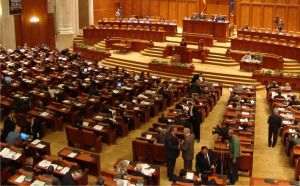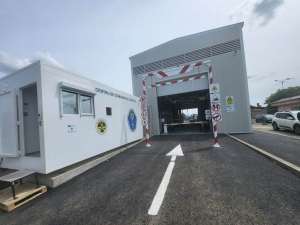Nevoile civililor palestinieni vor continua să fie o prioritate pentru România, în contextul în care este deschisă o investigaţie la adresa Agenţiei Naţiunilor Unite de Ajutorare şi Lucrări pentru Refugiaţii Palestinieni din Orientul Apropiat (UNRWA), a declarat, sâmbătă, ministrul Afacerilor Externe, Luminiţa Odobescu, relatează Agerpres.
Şefa diplomaţiei române a participat, la Bruxelles, la reuniunea informală a miniştrilor Afacerilor Externe din UE (Gymnich).
"Faptul că nu vom mai lansa noi proceduri pentru contribuţii voluntare la UNRWA nu înseamnă că nu vom mai sprijini în continuare civilii palestinieni care se află într-o situaţie extrem, extrem de dificilă. Nevoile civililor palestinieni vor continua să fie o prioritate pentru România, pentru Guvernul României. Şi acest lucru este foarte important să fie subliniat", a spus Odobescu.
Ea a arătat că ţara noastră se va coordona, în acest dosar, cu partenerii.
"Am avut un schimb de opinii şi pe situaţia din Gaza şi poziţia României este cunoscută. Am reiterat şi cu această ocazie importanţa coordonării strânse a eforturilor noastre, a eforturilor internaţionale, în vederea avansării către o pace durabilă în Orientul Mijlociu. (...) Cu privire la acuzaţiile la adresa unor angajaţi ai UNRWA, poziţia României este foarte clară - am susţinut importanţa unei investigaţii rapide şi serioase. Până la finalizarea acestei investigaţii, Ministerul de Externe nu va lansa proceduri noi pentru contribuţii voluntare, dar nevoile civililor palestinieni vor continua să fie o prioritate pentru România. Acest lucru trebuie să fie foarte clar", a subliniat Luminiţa Odobescu.
Ea a spus că, în acest moment, nu mai există solicitări către MAE ale unor cetăţeni români din regiune.
În urma acuzaţiilor israeliene potrivit cărora o parte din personal a participat la atacul Hamas din 7 octombrie, UE a anunţat că îşi va revizui sprijinul pentru UNRWA. În timp ce unii consideră că aceasta este o măsură urgentă, alţii avertizează asupra unei pedepse colective împotriva poporului palestinian, a relatat platforma media European Newsroom (enr) în articolul de fond publicat vineri.





























































1. fără titlu
(mesaj trimis de anonim în data de 04.02.2024, 07:46)
In sfarsit avem un ministru de externe care arata ca Romania.
1.1. Pace structurala prin buget federal (răspuns la opinia nr. 1)
(mesaj trimis de RS în data de 04.02.2024, 09:53)
Advancing Structural Peace: The Case for a Federalized European Union with Budgetary Integration
Introduction:
The discourse on the concepts of "structural peace" and a "United States of Europe equipped with a federal budget and treasury" resonates deeply within the ongoing narrative of European integration and the trajectory of the European Union (EU). This chapter delves into the intricate connection between these concepts, exploring their implications, goals, and the potential benefits that a more integrated EU could bring.
Structural Peace:
The term "structural peace" encapsulates the notion that robust and interconnected institutions, particularly in the context of a federal union, can be instrumental in fostering enduring peace and stability. A unified structure, underpinned by effective mechanisms for cooperation and economic interdependence, holds the potential to mitigate the risks of conflicts between member states.
European Union with Federal Budget and Treasury:
Envisioning a European Union equipped with a federal budget and treasury implies a significant centralization of financial resources and fiscal policy. This centralization is poised to foster a more balanced economic system, stimulating development and convergence across regions and member states. Simultaneously, it has the potential to fortify economic and political ties, thereby promoting stability within the EU.
Reducing the Risk of Intergovernmental Confrontation:
One of the primary advantages of establishing a common financial and fiscal system lies in the reduction of risks associated with intergovernmental confrontation. Member states, jointly sharing financial resources and responsibilities, develop a common interest in maintaining stability and avoiding conflicts, fostering a collaborative approach over divisive tendencies.
Promoting Common Interests:
The introduction of a federal budget and treasury could facilitate the efficient management of financial resources in support of shared EU goals. Investments in research, innovation, infrastructure, and regional development could be strategically directed, reinforcing economic and social cohesion within the EU.
Building a Unified Community:
The adoption of a federal structure has the potential to strengthen the sense of community and solidarity among member states. These close ties contribute to maintaining structural peace through enhanced cooperation and dialogue, as opposed to intergovernmental approaches that may exacerbate tensions.
In Conclusion: A Path Towards Consolidated Structural Peace:
In conclusion, the vision of a European Union with a federal budget and treasury emerges as a formidable force in consolidating structural peace. Through deeper integration, increased cohesion, and a commitment to shared values, this vision embodies a paradigm shift towards a more cooperative, stable, and resilient EU. The evolution towards such an integrated financial system signifies a profound dedication to the common objectives and ideals that underpin the very essence of the European Union.
2. fără titlu
(mesaj trimis de anonim în data de 04.02.2024, 08:57)
Pentru ca e femeie.Daca mai multe femei vor fi in pozitii de a decide, va fi pace pe Terra. Femeia e cea care da viata si apara viata!
3. MAE propune acest proiect?
(mesaj trimis de anonim în data de 04.02.2024, 13:13)
Proiect de Implementare a Declarației Universale a Păcii pentru Construirea Păcii Durabile
1.1 Context și Justificare
Pentru a contribui la construirea unei lumi mai pașnice și durabile, proiectul nostru se concentrează pe implementarea unei Declarații Universale a Păcii, care va cuprinde principii și valori fundamentale pentru promovarea înțelegerii reciproce, cooperării și respectului pentru drepturile omului.
1.2 Obiective
-Implementarea Declarației Universale a Păcii la nivel național și internațional.
-Promovarea culturii păcii prin educație și conștientizare.
-Facilitarea proceselor de dezarmare și prevenirea conflictelor violente.
2.1 Implementarea Declarației Universale a Păcii
-Dezvoltarea unui plan de acțiune pentru adoptarea Declarației la nivel guvernamental și internațional.
-Consultarea și implicarea societății civile, organizațiilor non-guvernamentale și a reprezentanților comunităților în procesul de implementare.
2.2 Promovarea Culturii Păcii
-Integrarea principiilor de pace în programele educaționale la toate nivelurile.
-Organizarea de campanii de conștientizare și evenimente culturale care să promoveze dialogul și cooperarea.
2.3 Facilitarea Dezarmării
-Elaborarea și implementarea unor strategii de dezarmare în colaborare cu organizațiile internaționale relevante.
-Inițierea unor programe de prevenire a conflictelor prin dialog și negocieri.
3.1 Parteneriate și Colaborare
-Stabilirea parteneriatelor cu guverne, organizații internaționale, societatea civilă și sectorul privat.
-Colaborarea cu instituții de învățământ, ONG-uri și mass-media pentru a amplifica mesajul și impactul proiectului.
3.2 Monitorizare și Evaluare
-Dezvoltarea unui sistem de monitorizare a progresului și impactului implementării proiectului.
-Colectarea și analiza datelor privind participarea și implicarea comunităților în procesul de construire a păcii.
4.1 Resurse Umane
-Angajarea unui personal cu expertiză în relații internaționale, drepturile omului, educație și dezvoltare comunitară.
4.2 Resurse Materiale și Financiare
-Identificarea și securizarea resurselor financiare necesare pentru implementarea proiectului prin colaborare cu organizații finanțatoare, guverne și donatori privați.
Faza 1 (6 luni): Dezvoltarea Declarației Universale a Păcii și pregătirea terenului pentru implementare.
Faza 2 (1-2 ani): Implementarea declarației și promovarea culturii păcii.
Faza 3 (2-3 ani): Facilitarea proceselor de dezarmare și evaluarea impactului.
Prin implementarea acestui proiect, anticipăm o creștere semnificativă a conștientizării și angajamentului față de valorile păcii la nivel global. Așteptăm, de asemenea, o scădere a conflictelor violente și o contribuție la stabilirea unui climat internațional de cooperare și înțelegere reciprocă.
4. fără titlu
(mesaj trimis de anonim în data de 04.02.2024, 13:58)
"Universal Declaration of Peace" is an Urgency
While there is no specific "Universal Declaration of Peace" comparable to the Universal Declaration of Human Rights, the idea of a global commitment to peace and security is certainly a noble and aspirational concept.
3.1 Principles of a "Universal Declaration of Peace"
In a historic moment of shared commitment, we, the inhabitants of this planet, commencing an era of definitive abandonment of war and the legal abolition of any engagement in it, solemnly adopt this Universal Declaration of Peace, akin to the Magna Carta of our time.
3.1.1 Peace, a Universal Good of Humanity
Peace is declared as a fundamental right of humanity. All inhabitants of the planet, present and future, as well as all institutional structures serving their interests, including states, have the fundamental duty to defend, develop, make it as resilient as possible, and promote it through all means—economic, political, cultural, educational, etc.
3.1.2 Indivisibility of World Peace
World peace is proclaimed as indivisible and rightfully belongs, as a collective good, to humanity. No conditions, circumstances,o rconflictual situations, competitions, religious, cultural,o rother differences, no economic, political, ideological objectives, etc., can justify, under any reservation, the organized institutional recourse to the use of force, coercion, oppression, deprivation of citizens' fundamental rights and freedoms, forced displacement,o rthe destruction of human communities, mass killing and genocide, the systematic destruction of planetaryo rlocal ecosystems, and the systematic destruction of social infrastructures.
3.1.3 Crime against Humanity
Anyone who plans, prepares, decides, sets in motion, and leads/coordinates such actions that harm, create a threat,o rconstitute a violation of peace, regardless of their nature and the extent of the dangers created, commits a crime against humanity.
3.1.4 Legal Sanctions
fr om the entry into force of this Declaration, its provisions enjoy the absolute privilege of constitutional precedence and will become immediately appealable in legal forums designated to adjudicate on this matter and the legal responsibility of perpetrators.
By adopting this Universal Declaration of Peace, the signatories solemnly ackn owledge and legally consecrate their common commitment to a more peaceful, just, and prosperous world, based on mutual respect and international cooperation.
Déclaration universelle de la paix
Nous, les habitants de cette planète, inaugurant une ère d'abandon définitif de la guerre et de l'abolition légale de toute participation à celle-ci, adoptons solennellement cette Déclaration universelle de la paix, semblable à la Magna Carta de notre époque.
La paix, un bien universel de l'humanité
La paix est un droit fondamental de l'humanité. Tous les habitants de la planète, présents et futurs, ainsi que toutes les structures institutionnelles servant leurs intérêts, y compris les États, ont le devoir fondamental de la défendre, de la développer, de la rendre aussi résiliente que possible et de la promouvoir par tous les moyens, économiques, politiques, culturels, éducatifs, etc.
Indivisibilité de la paix mondiale
La paix mondiale est indivisible et appartient légitimement, en tant que bien collectif, à l'humanité. Aucune condition, circonstance ou situation conflictuelle, compétition, différence religieuse, culturelle ou autre, aucun objectif économique, politique, idéologique, etc., ne peut justifier, sous aucune réserve, le recours institutionnel organisé à l'utilisation de la force, à la contrainte, à l'oppression, à la privation des droits fondamentaux et des libertés des citoyens, au déplacement forcé ou à la destruction des communautés humaines, au meurtre de masse et au génocide, à la destruction systématique des écosystèmes planétaires ou locaux et à la destruction systématique des infrastructures sociales.
Crime contre l'humanité
Toute personne qui planifie, prépare, décide, met en mouvement et dirige/coordonne de telles actions portant atteinte, créant une menace ou constituant une violation de la paix, quelle que soit leur nature et l'étendue des dangers créés, commet un crime contre l'humanité.
Sanctions juridiques
Dès l'entrée en vigueur de la présente Déclaration, ses dispositions bénéficient du privilège absolu de la prééminence constitutionnelle et deviendront immédiatement susceptibles d'appel devant les instances légales désignées pour statuer sur cette question et sur la responsabilité légale des auteurs.
En adoptant cette Déclaration universelle de la paix, les signataires reconnaissent solennellement et consacrent légalement leur engagement commun en faveur d'un monde plus paisible, plus juste et plus prospère, fondé sur le respect mutuel et la coopération internationale.
Declarație Universală a Păcii
Noi, locuitorii acestei planete, începând o eră definitivă de părăsire a războiului și abolire legală a oricărei îndeletniciri a acestuia, adoptăm solemn această Declarație Universală a Păcii,
5. "Magna Carta of Peace"
(mesaj trimis de anonim în data de 04.02.2024, 15:12)
Implementing a "Magna Carta of Peace" would be a significant and complex undertaking, involving international cooperation, diplomatic efforts, and a commitment to fostering a culture of peace globally. Here's a broad outline of how such a project might be approached:
Drafting and International Consensus
Convene International Experts: Assemble a group of experts in international relations, law, diplomacy, human rights, and peace studies to collaborate on drafting the Magna Carta of Peace.
Seek Input fr om Stakeholders: Gather input fr om governments, non-governmental organizations (NGOs), civil society, and individuals to ensure a diverse range of perspectives.
Diplomatic Outreach
Engage United Nations: Work with the United Nations to facilitate discussions and gain support for the Magna Carta of Peace. Leverage existing UN platforms and bodies to promote the project.
Host Diplomatic Conferences: Organize international conferences and summits whe rerepresentatives fr om nations worldwide can discuss and negotiate the terms of the Magna Carta of Peace.
Global Advocacy and Awareness
Build a Coalition of Support: Garner support fr om influential individuals, organizations, and nations committed to peace. Create a coalition that actively promotes the Magna Carta of Peace.
Public Awareness Campaigns: Conduct public awareness campaigns to inform people around the world about the importance of the Magna Carta of Peace and how it can contribute to global stability.
Education for Peace
Incorporate into Educational Curricula: Work with national education systems to incorporate teachings about the Magna Carta of Peace into school curricula, promoting a culture of peace fr om an early age.
Develop Educational Programs: Create educational programs and materials for universities, training institutions, and online platforms to educate people about the principles of the Magna Carta of Peace.
Implementation and Monitoring
National Implementation Plans: Encourage nations to develop national plans for the implementation of the Magna Carta of Peace, integrating its principles into their policies and practices.
Monitoring Mechanisms: Establish international monitoring mechanisms to track progress and adherence to the Magna Carta of Peace, fostering accountability.
Conflict Prevention and Resolution
Create Conflict Prevention Strategies: Develop strategies for preventing conflicts by addressing root causes, promoting dialogue, and building trust.
Facilitate Mediation and Peacebuilding: Establish mechanisms for international mediation and peacebuilding efforts to resolve conflicts and promote reconciliation.
Resource Reallocation
Advocate for Resource Reallocation: Encourage nations to reallocate resources fr om military spending to initiatives that promote social and economic development, contributing to long-term peace.
International Treaties and Agreements
Integrate Peace Principles into Treaties: Work toward integrating the principles of the Magna Carta of Peace into existing and future international treaties and agreements.
Regular Review and up dates
Periodic Assessments: Conduct periodic assessments and reviews to evaluate the effectiveness of the Magna Carta of Peace and make adjustments based on changing global circumstances.
Youth Involvement
Youth Engagement Programs: Involve young people in the promotion and implementation of the Magna Carta of Peace through youth engagement programs, encouraging their active participation in building a more peaceful world.
The success of such a project would depend on the commitment of the international community, the active involvement of governments, civil society, and individuals, and ongoing efforts to promote the principles of peace and stability globally
6. fără titlu
(mesaj trimis de anonim în data de 04.02.2024, 15:27)
Integrating Human Security into European Governance
The concluding chapter synthesizes the discussed elements, highlighting the pivotal role of human security in the envisioned United States of Europe. Through the integration of financial structures, the fostering of structural peace, and alignment with universal declarations of peace, the EU can position itself as a beacon of stability, prosperity, and collective well-being.
Conclusion
A Harmonious Future Anchored in Human Security
In conclusion, this comprehensive exploration ch arts a course for a future whe rehuman security takes precedence in European priorities. The vision of a United States of Europe, fortified by integrated financial structures, structural peace, and a commitment to universal ideals, portrays a continent that prioritizes the well-being and security of its diverse citizens. As we envisage this harmonious future, the imperative integration of these elements becomes the cornerstone in shaping a United States of Europe that genuinely serves as a sanctuary for human prosperity and peace.